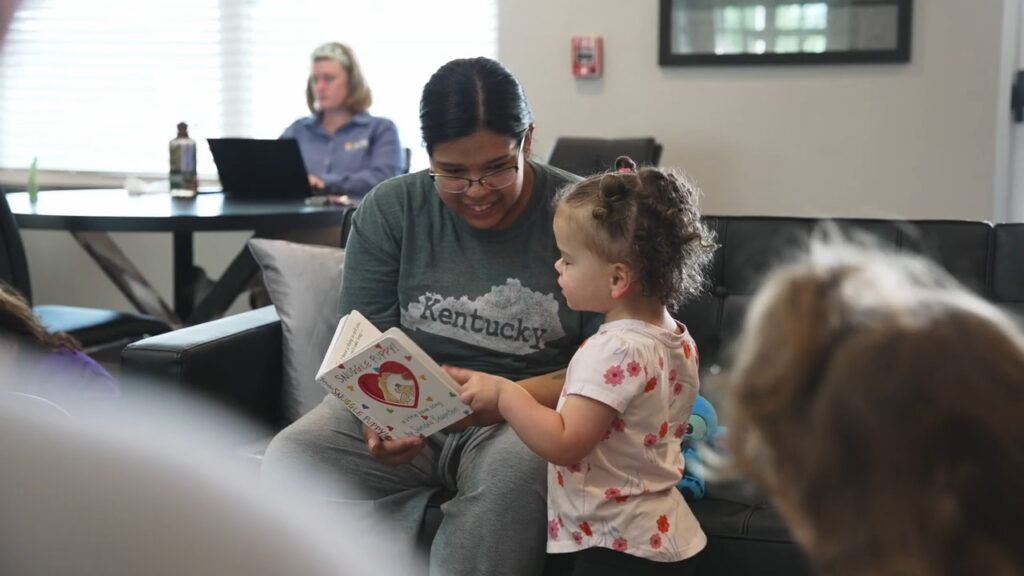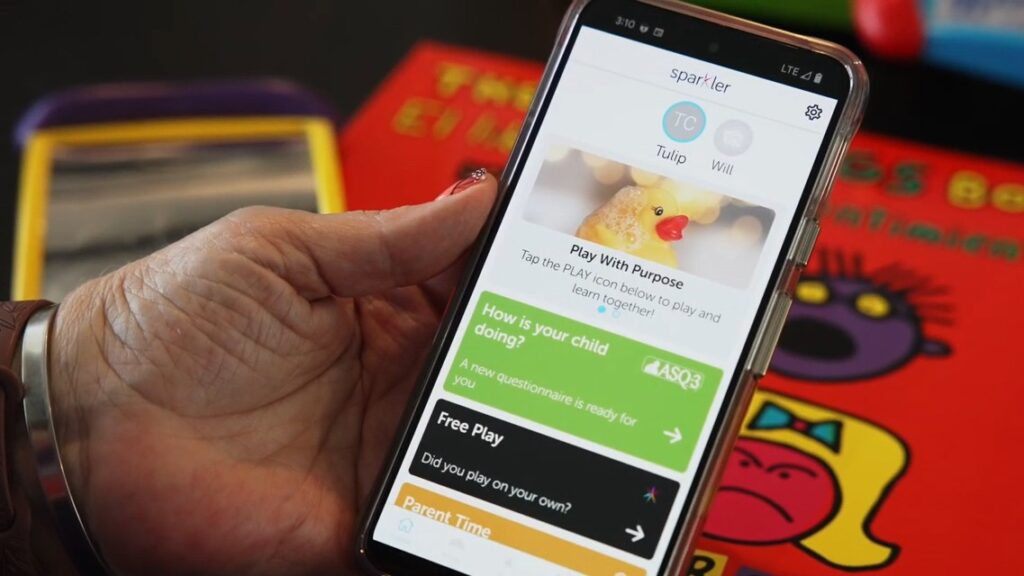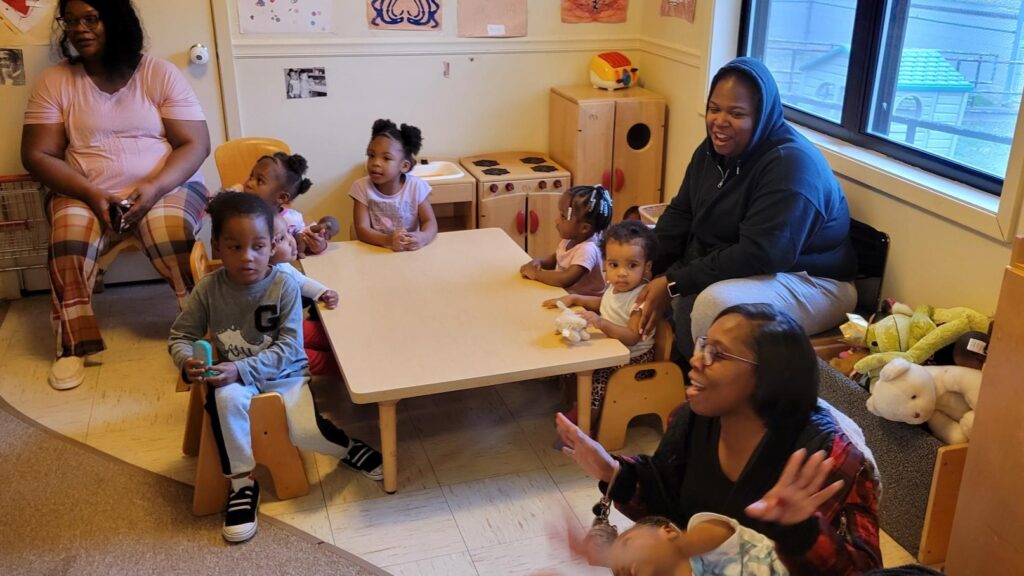The possibilities of play: How families learn together
Editor’s Note: This month, NCFL Colorado Director Maureen Rudy and Kentucky Assistant Director Allison Miller, Ed.D. discuss the power of play as a learning tool for early childhood development.
Access to quality early childhood programs and resources continues to be a need many families encounter. It can be difficult to sift through information and know what is the best way to encourage young children to learn. Fortunately, NCFL has over three decades of experience and learning in creating quality early childhood content and providing families with opportunities to connect through play.
Paramount to interactive play is NCFL’s belief in parents as their child’s first and most important teacher. The National Association for the Education of Young Children (NAEYC) notes that many parenting adults may not feel like a teacher at first. This feeling is normal, but should not stop parents from feeling empowered to help their child learn and grow. NAEYC suggests parenting adults start with simple activities such as telling stories, reading books together, and using everyday routines to connect with their children. Early bonds are fundamental for care and protection, and NCFL has created an adult and child playgroup experience, Play with Purpose™, built to honor the role of the parenting adult while providing foundational skills through intentional encounters.
The Play with Purpose curriculum is evidence-based and has brought families together through joyful play in age-appropriate groups in Colorado, Kentucky, and California. To date, sessions have been conducted in libraries and early learning environments. Playgroups are structured to address early literacy skills (birth through age 3) and kindergarten readiness (ages 3-5). Play with Purpose is designed to build on the previously mentioned activities noted by NAEYC (reading, storytelling, and routines) through themes such as imaginative play, song and dance, rhyming, learning about emotions, and sensory play. Families learn how to use open-ended materials such as blocks, scarves, stuffed animals, and lacing beads to encourage early literacy and language development that leads to school readiness.

In Play with Purpose playgroup sessions, parents are introduced to the concept of learning through play as an age appropriate way for babies and toddlers to explore and understand the world around them. Play encourages language and literacy skills and can also incorporate early math and science talk, whole body movement, and fine motor skills. It invites parents to consider how almost any location can be a place for learning and play, from the grocery store to the park to the car or bus that gets you there.
Each playgroup cohort begins with an orientation that invites parents to engage with accompanying digital tools that can help support developmental growth. The curriculum is designed to work in tandem with the Sparkler app to encourage exploration of their environment with activities that connect to heart, words, mind, and body. The app provides weekly learning for caregiving adults that aligns to session themes; helps to encourage free play across categories like pretend, create, and go; and serves as a platform for communication between parent and facilitator. This offers parents an easy way to engage no matter where they are and helps them see the progress their child is making over time.

The Ages & Stages Questionnaire® is also included within the Sparkler app and provides parents with a reliable, accurate developmental and social-emotional screening for children. Through the questionnaire, parents can gauge progress of their child’s developmental skills and supplement growth through the suggested activities. It can also highlight any potential developmental delays so that parents are alert and able to address them with a healthcare provider long before the child enters school.
NCFL spearheads efforts to plant Play with Purpose within communities and provides professional learning opportunities to cultivate practitioners who then lead sessions with families. In this type of co-facilitation model, NCFL provides the curricular materials to facilitators and shares expertise via coaching support through the duration of the sessions. This ensures that person-to-person support is in place and that Play with Purpose is delivered with fidelity. It also invites local facilitators who know their communities to consider how best to sustain playgroups into the future. In addition, NCFL’s co-facilitation provides facilitators with support in finding family resources such as low or no-cost childcare; access to speech, language, and occupational therapy providers; and information on how to engage parenting adults in conversations that encourage school transition goals for their children.

Evaluations of Play with Purpose playgroups in Kentucky have found that parenting adults who complete the program have increased confidence in the skills they need to help their child learn. Additionally, parenting adults surveyed noted that as a result of the program, they enjoyed more of the time they spent with their child (81%) and were better able to deal with the day-to-day stresses of parenting (83%). This strengthening of coping skills is especially important in light of a 2024 Surgeon General advisory which noted the high levels of stress reported by parenting adults and called for a “fundamental shift in how we value and prioritize the mental health and well-being of parents.”
This is a critical moment for helping parents make the connection between play and learning for their young children. The National Institute for Early Education Research (NIEER) Preschool Learning Activities survey recently found that the percentage of parents reading to their children has fallen by an average of 14 percentage points from pre-pandemic levels. Programs like Play with Purpose can help to reverse this trend by providing parenting adults with the tools they need to make the most of the time they have together at home. While families may feel pulled in multiple directions, connecting with their children can be done any time and any place. Simply reading together, following your child’s lead during play, or making time to connect throughout the day can equip your child for kindergarten and beyond.
Potential partners who are interested in embedding playful learning in their own communities can learn more about Play with Purpose through the following video.
Or consider attending the 2025 Families Learning Conference to share your promising practices for building early learning outcomes through play or other early childhood experiences. Session proposals are being accepted through April 18, 2025.
About the Authors

Maureen E. Rudy
Director, Colorado
Maureen is the Colorado Director of the Statewide Family Engagement Center, tasked with co-creating thriving and aligned family learning systems that build upon established family engagement infrastructure. She is steeped in holistic approaches that consider the needs of parents and children, and has overseen adult education and family literacy efforts that uplift and support learners of all ages.
Maureen earned a Master of Science in Nonprofit Management from Regis University and a Bachelor of Arts in Journalism and English from Indiana University. She is an avowed lifelong learner and is usually taking a course, serving on a board of directors, or prepping a conference presentation. When not perusing the shelves of a library, she’s typically logging miles on trails or in a pool, traveling the globe, or trying out a new recipe with family and friends.

Allison Miller, Ed.D.
Assistant Director, Kentucky
Allison Miller collaborates with the LENA START and LENA HOME team through Say and Play, a program funded by Bloomberg, by providing professional development and technical assistance to program coordinators. She also provides professional development and technical assistance to early childhood programs in the Jefferson County Public School system in Louisville, Kentucky, through the JCPS-NCFL Family Engagement Partnership. She brings a diverse understanding of early childhood education to NCFL with over ten years of experience in the field, having served as an Education Manager at Community Action of Southern Indiana Head Start, and a preschool director in Harrison County, Indiana. Allison holds a Doctorate in Education from Spalding University in Educational Leadership, as well as a Masters in Education with an emphasis in Elementary Education and Teacher Leadership from Indiana Wesleyan University. These degrees have provided her with the foundational understanding of child development as it relates to training and assisting adult learners in the field. Allison is married to Adam Miller, band director at Jeffersonville High School. Together they have one son, Gabe, and enjoy traveling together, reading, and participating in the rich arts culture of Jeffersonville, Indiana.